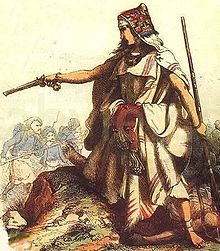Lalla Fatma N'Soumer
Lalla Fadhma n'Soumer Faḍma n Sumer | |
|---|---|
ⵍⴰⵍⵍⴰ ⴼⴰⴹⵎⴰ ⵏ ⵙⵓⵎⴻⵔ (Kabyle) | |
 | |
| Born | Fadhma n Taieb n cheikh Ali u Aissa c. 1830 Werja, Abi Youcef |
| Died | c. 1863 (aged 32–33) |
| Nationality | Algerian |
| Known for | Kabyle resistance fighter against the French conquest of Algeria |
| History of Algeria |
|---|
 |
Lalla Fadhma n'Soumer (Kabyle: ⵍⴰⵍⵍⴰ ⴼⴰⴹⵎⴰ ⵏ ⵙⵓⵎⴻⵔ, romanized: Lalla Faḍma n Sumer; c.1830 – c. 1863) was an important figure of the Algerian resistance movement during the first years of the French colonial invasion of Algeria. She was seen as the embodiment of the struggle.
Lalla, the female equivalent of the Berber word mass, is an honorific reserved for women of high rank, or who are venerated as saints.
From 1854 to July 1857, she assisted in leading a resistance against the French. Once captured by French forces, she was imprisoned until her death six years later. Her disciples would believe that she was gifted powers by God, including the abilities to see the future and cure illness.[1]
Her ashes were transferred in 1994 from the cemetery of Sidi Abdellah, 100 meters from the zawiya Boumâali in Tourtatine towards the Square of the Martyrs of El Alia Cemetery.
Legacy
Lalla Fadhma's life has been documented in the movie Fadhma N'Soumer, directed by Belkacem Hadjadj and released in 2014. The lead role of Fadhma N'Soumer was played by French actress Laetitia Eido [2]. A few statues of Lalla Fatma are in display in Algeria. A few schools and streets bear her name in Algeria.
References
This article includes a list of references, related reading, or external links, but its sources remain unclear because it lacks inline citations. (December 2016) |
- ^ "Imperialism in North Africa". Women in World History: Module 9. Center for History and New Media. Retrieved 2017-08-25.
- ^ "Fadhma N'Soumer (2014)". IMDb. Retrieved 7 July 2017.
- Emile Carrey, Récits de Kabylie. Campagne de 1857, Paris 1858
- Adolphe Hanoteau, Poésies populaires de la Kabylie du Jurjura, Paris 1867
- Tahar Oussedik, Lalla Fadhma n'Summer, Algeri, Laphomic, 1983
- Boukhalfa Bitam, Fadhma n'Soumer. Une autre lecture du combat de l'illustre fille de Werja, Draa Ben Khedda, Aurassi, 2000
External links
- (in French) An online biography on Algiers parliament site - (often incorrect and a bit emphatic)[citation needed]
- (in French) An article confronting information on Lalla Fadhma coming from oral and written sources
- (in French) Emile Carrey, Récits de Kabylie. Campagne de 1857, page 280.
You can help expand this article with text translated from the corresponding article in Italian. (October 2012) Click [show] for important translation instructions.
|
- 1830 births
- 1863 deaths
- African resistance to colonialism
- People from Abi Youcef
- Kabyle people
- Algerian women in politics
- Women in 19th-century warfare
- African women in war
- Berber rebels
- Deaths in Algeria
- Deaths in custody
- Prisoners of war held by France
- Algerian prisoners and detainees
- Algerian nationalism
- 19th-century Algerian women
